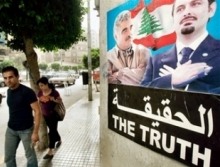 The Beirut government is in paralysis, business deals are on hold and rumours abound as Lebanon anxiously awaits indictments by a UN tribunal probing former premier Rafiq Hariri’s murder.
The Beirut government is in paralysis, business deals are on hold and rumours abound as Lebanon anxiously awaits indictments by a UN tribunal probing former premier Rafiq Hariri’s murder.
The Special Tribunal for Lebanon (STL) said on December 9 that the confidential contents of the indictments for the 2005 killing of Hariri and 22 others in a Beirut blast would be filed for confirmation “very, very soon.”
“My daughter and her husband in Dubai will not come for Christmas. They have a baby and are afraid there will be tensions and that the road to the airport could close,” said Robert Faytroun, a 55-year-old Christian.
The STL is reportedly set to indict high-ranking operatives of Shiite group Hezbollah, Lebanon’s most powerful military force, which accuses the court of serving Israel and of having based its findings on false testimony.
Hezbollah has said it expects to be falsely accused of involvement and warned against any attempt to arrest its members, raising fears of instability in the small, multi-religious Mediterranean country.
Hassan Nasrallah, who heads the militant movement, has urged Lebanon’s deeply divided unity government to step aside and allow him to deal with the STL which he brands a US-Israeli plot.
There is “total paralysis of state institutions, including the government, which is incapable of taking any decision,” Sami Salhab, a law professor at the Lebanese University, said.
The awaited indictments have split the unity government, with Hezbollah and its supporters pitted against a camp led by Western-backed Prime Minister Saad Hariri, son of the assassinated Sunni leader.
The stand-off has frozen the work of the cabinet, in which Hezbollah is represented and which has only met once in more than a month to deal with 300 items on its agenda.
“The government cannot appoint a single official. It’s not allowed, as the country has shut down,” said Salhab.
The central bank governor’s term expires next year, and no successor has been named. Likewise, the head of general security retired two weeks ago, and no new nominee has been announced.
A decision on renting a ship-based power generator to ease Lebanon’s chronic electricity shortages is also on hold, and Sukleen, a Hariri-started company which manages garbage collection, is waiting for its contract to be renewed.
The government must decide on “the ship rental for power generation as a temporary solution to the problem of shortages, and renew urgent contracts, such as for Sukleen,” said Mona Ofeish, a state minister.
“The state still has not compensated the victims of the storms that hit Lebanon,” the minister close to President Michel Sleiman, who is considered politically neutral between the two camps, told AFP.
“Houses were swept away by floods, fishermen lost their boats and may die of hunger,” added Ofeish of heavy winds and rain that lashed the country just over a week ago.
Developers say that building projects, which had turned Lebanon into one big construction site since the end of a 1975-1990 civil war, have slowed.
Financial institutions such as ratings agency Standard & Poor’s have warned that a slowdown in promised structural reforms could impact the high economic growth of post-war years.
On the streets, there is a palpable feeling of growing discontent.
“My clients have cancelled their orders for next summer because they could not sell their winter merchandise,” said Nawal Sarkis, a wholesaler of women’s accessories.
“They should issue this indictment and be done with it. People are fed up,” she said.
“Everything is frozen because the purchasing power is going down. I have no hope in my country,” chimed in restaurant owner Jean Khashan. AFP

Leave a Reply
You must be logged in to post a comment.